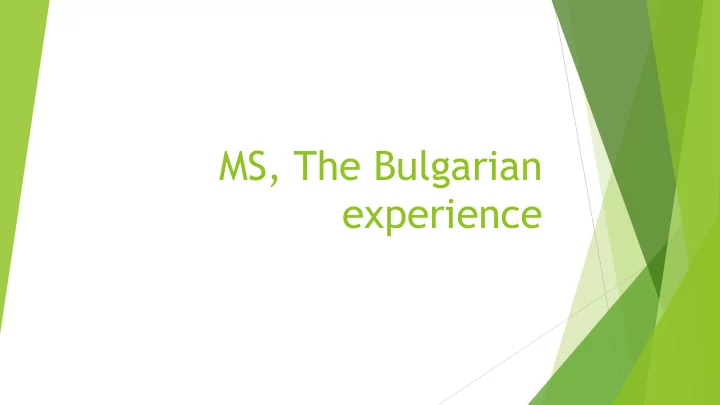

MS, The Bulgarian experience
Ayurveda, the science of future u Science of life u Science that identifies the individual and treats it. u Kriyakala or science that identifies disease earlier. u Considering mind and body as a whole ( whole more than the sum of its parts.) u The scientific theories like quantum physics, feed back mechanism, entropy etc are well conceived in Ayurveda. u Finally it is the Gods own medicine.
MS and what is it? u MS is a degenerative neurological disease with a sudden onset and maximum chronicity. u It is a Neuro-psyco-immuno-metabolic disease. u Ayurveda did not consider it as a auto-immune disease. u Multiple etiology.
Dr Prasanth's Ayurveda for Multiple Sclerosis (PAMS) u Knowhow of 3 generation. u Therapy and medicines crafted from the experience of 17 years. u Patented oils and medicines.
Comparison of types of MS with PAMS 1. Vataja – PPMS, SPMS 2. Pittaja- RRMS with relation to mind. 3. Kaphaja – RRMS, slow progressing type. 4. Vata-Pittajam –PRMS & RRMS (freq relapse) 5. Kapha pittajam – RRMS with best prognosis 6. Tridoshajam - NMO
Grading MS, a new way u Prakruthi-Vikruthi – nature of person and disease. u Rogi bala – mind body strength u MRI u Type of MS
Neurology and Ayurveda u 80 types of vata vyadhi or nerve related disorders. u Nervous system is considered as the main system that leads the mind and body. u Most descriptive branch in Ayurveda. u All diseases have a neurological root.
Herbal combination guidelines for MS - PAMS Ayurveda According to Ø Prakruthi – Nature of the person – 40% Ø Vyadhi – Disease, here MS – 50% Ø Lakshana – symptoms – 10%
Treatment guidelines 1. Adhi-Stana Chikitsa or Treating the source of illness - the central nervous system 2. Agni Sara Chikitsa or Reorganizing or fine tuning the metabolism – Correcting the digestive fire in a person so that the cellular metabolism improves 3. Kaya Sattwa Chikitsa - Mind Body balancing
Types of treatment and medicines u Shirovasthi, shirodhara, tailadhara, kashaya dhara, njavara , Marma svanthvana, choorna abhyanga, ela pothichil, Panchakarma in less than 5% of patients. u Individualised yoga program for MS u Using around 120 different herbs.
Shirovasthi u Oils what are concentrated several times with herbal extracts are used in SV.
Side effects of PAMS treatment u Weight loss u Skin irritation u Menstrual irregularities? u Lack of sustanance of benefits of treatment. (EDSS 6.5 and above)
Who are eligible for PAMS treatment Those Who can- Ø Fully concentrate and involve in the treatment. Ø Willing to change life style and diet. Ø follow the instructions of doctor correctly.
Feedback from 34 patients from Bulgaria EDSS TO 4.5 EDSS 5-6.5 EDSS 7 above 17 patients 10 patients 7 patients
Beneficial results u 28 patients show improvements in treatments. u 7 patients finished treatment showed improvement and stability. u 12 MRI shows reduction size and number of lesion.
Non beneficial effects of treatment u 9 patients discontinued. u 7 had relapse but not severe. u 7 among the 9 discontinued are above EDSS 6.5 u Financial reasons for 3 who discontinued. u 12 MRI shows activity without relapse with minor symptoms
Aims of PAMS treatment u Progression of MS u 2.To enable the patient to lead a normal life u 3.Slow and stable recovery for advanced stage of MS – Advanced stage considered as - above the 5.5 of EDSS mark u
Contact u Web –www.msayurveda.com u simona.gerber@web.de u drprasanth@web.de u Phone – Simona 0091 8086151111 Dr Prasanth +91 8589909090 Dr Sharmila +91 8593096665
Recommend
More recommend